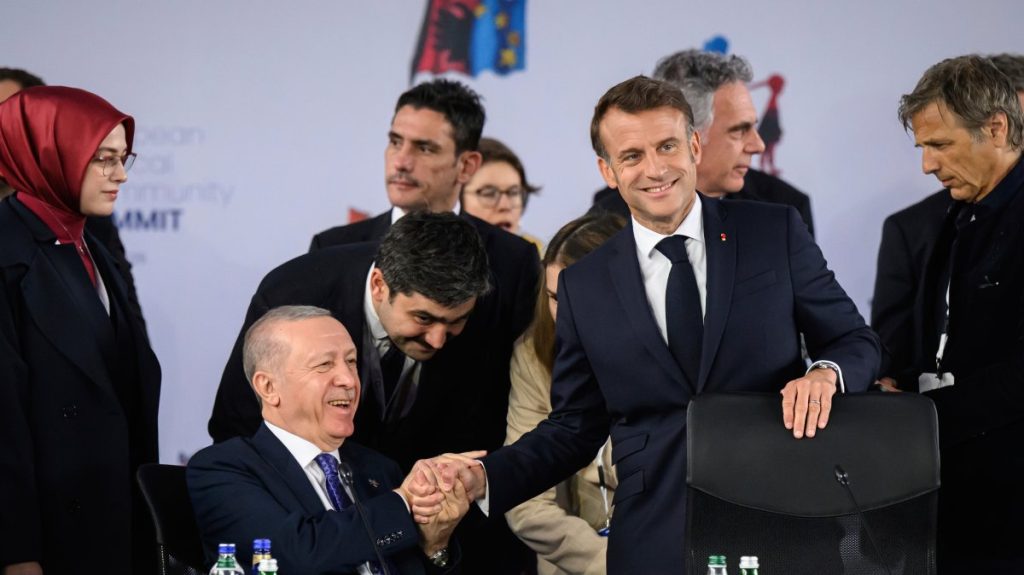Türkiye is emerging as a pivotal partner as Europe contends with the dual challenges of declining U.S. engagement in NATO and persisting fears of Russia, a leading analyst says.
Timothy Ash, a senior emerging markets strategist and long-time Türkiye analyst, believes Ankara is uniquely positioned to help fill the strategic and industrial gaps that now confront European defense planning.
In an interview with Anadolu Agency (AA) on Tuesday, Ash highlighted the fundamental shifts in Europe’s security architecture, driven in part by the leadership style of U.S. President Donald Trump and the waning American military backstop that European NATO allies have long relied on.
“The U.S. security backstop for Europe and NATO is evaporating quickly,” he said, adding that this comes when Europe is facing significant vulnerabilities due to its lag in defense spending and military-industrial production, coupled with the threat of Russia. Ash stressed that although Europe possesses advanced military technologies, its defense manufacturing capacity is ill-equipped to scale production in response to rapidly increasing threats.
“This is where Türkiye, with its formidable military and burgeoning defense industry, could fill the gap,” he said, emphasizing that Türkiye’s ability to scale up production could help Europe address immediate supply gaps in defense manufacturing. “Türkiye boasts the largest military in Europe, outside of Ukraine and Russia, with nearly 400,000 troops and a rapidly growing military-industrial complex … Türkiye can help France, the U.K., and other countries maintain a credible peacekeeping force in Ukraine by contributing tens of thousands of ground troops,” he noted.
Ankara, he continued, also has “the potential to partner with European nations in technology exchanges, combining Europe’s scientific expertise with its own manufacturing capacity.” He cited the recent collaboration between Turkish drone producer Baykar and Italy’s defense contractor Leonardo as a promising sign of growing defense partnerships. More such partnerships are likely to follow, driven by mutual interests in countering regional threats and diversifying supply chains, he said.
Türkiye’s relevance extends well beyond the battlefield, with Ash underlining the country’s value to Europe in terms of both economic integration and energy diversification. With its extensive manufacturing base already embedded within European supply chains, especially in the automotive sector, Türkiye can help the continent tackle challenges like the rise of Chinese electric vehicle imports, he said. Retooling Türkiye’s manufacturing base toward the military-industrial complex could alleviate short-term economic pressures, while meeting Europe’s defense needs, he explained.
“It kills two birds with one stone,” said Ash.
On energy, he underlined that Türkiye’s geographic location makes it a crucial energy transit hub, offering alternative supply routes from Central Asia, the South Caucasus, and the Middle East that could help Europe diversify away from its over-dependence on Russian gas. “This aligns with Europe’s accelerated energy transition and push for renewables,” said the analyst. While the potential for strategic cooperation is significant, Ash acknowledged the political obstacles in Türkiye’s relations with the EU.
He pointed out that Türkiye’s EU accession bid has been “dead in the water” since setbacks under former French President Nicolas Sarkozy and ex-German Chancellor Angela Merkel, compounded by the country’s internal political developments. Nevertheless, Ash believes the war in Ukraine has prompted a reevaluation and “new realism” in European capitals, making national security now the continent’s top priority. “Europe needs to wake up to the reality that it’s not able to sustain its own defense,” Ash said, stressing the need for compromises such as updating the EU-Türkiye Customs Union to facilitate deeper cooperation.
Ash also underscored the importance of Türkiye’s strategic positioning in global geopolitics, including its relatively favorable relationship with the Trump administration. He noted that President Recep Tayyip Erdoğan’s personal rapport with Trump has shielded Türkiye from some of the harsher trade measures imposed on other countries and led to progress on issues like F-16 upgrades and potential reentry into the F-35 program.
“Türkiye’s role in Syria, Iran and the Eastern Mediterranean further underscores its importance as a major regional player,” he added.
Ash also pointed to strong ties with the U.K. as evidence of Türkiye’s growing relevance, saying that bilateral relations are at their strongest in 25 years, driven by mutual respect and defense cooperation.
“The U.K., alongside Spain and Italy, is eager to advance deals like the Eurofighter sale, despite German reservations,” he said. Looking ahead, Ash suggested that Turkish defense firms could capitalize on the EU’s plan to invest 500 billion euros (over $560 billion) in defense by acquiring or partnering with European companies, enabling Ankara to participate in major NATO procurement programs.
“The natural partner for Türkiye is Europe,” Ash concluded, emphasizing their deep economic ties and shared interests in addressing emerging regional and global challenges.


